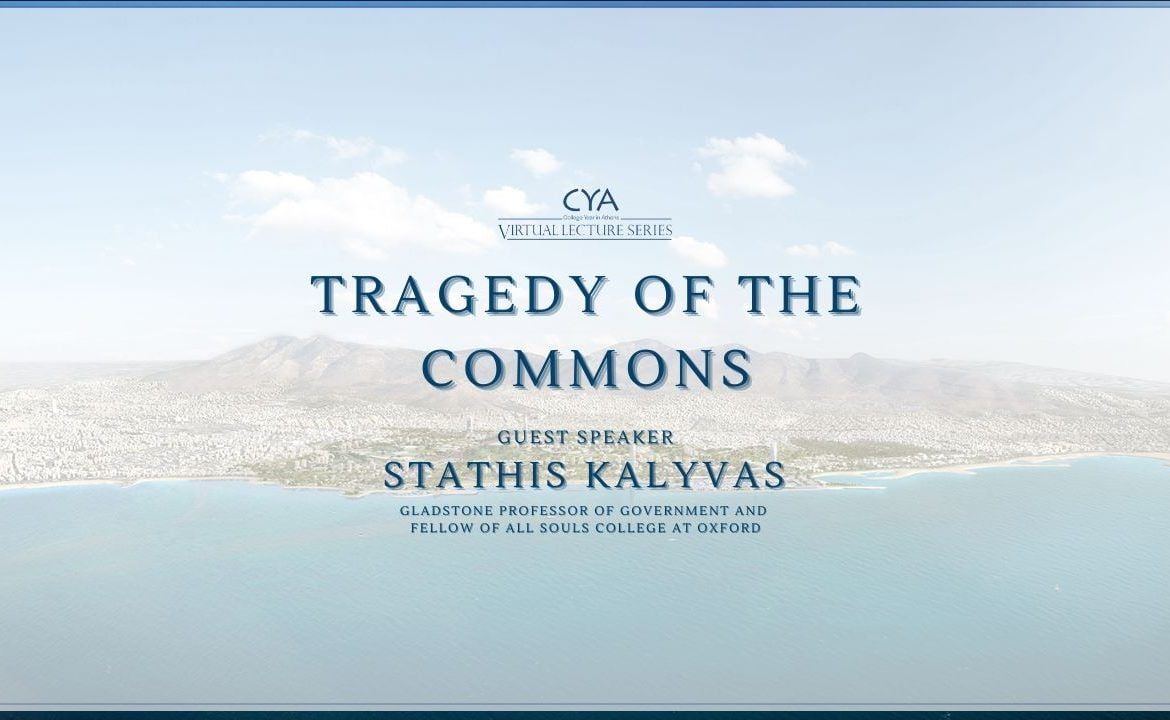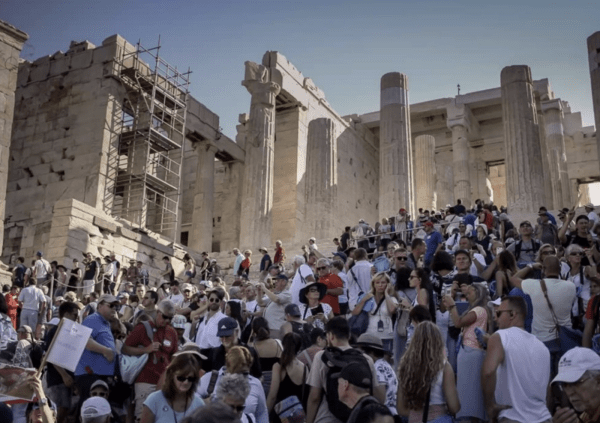
Virtual Lecture Series: Tragedy of the Commons with Prof. Stathis Kalyvas
CYA recently hosted a virtual lecture by renowned political scientist and economist, Stathis Kalyvas, Gladstone Professor of Government and fellow of All Souls College at Oxford. Titled “The Tragedy of the Commons: Examining the Political and Economic Consequences of Over-Exploitation”, the lecture was held as part of CYA’s Virtual Lecture Series, with a large number of attendees tuning in from around the world to hear Kalyvas’ insights and expertise on the subject.
The tragedy of the commons is a term used to describe a situation where a shared resource is over-exploited by individuals pursuing their own self-interest, leading to depletion of the resource and ultimately, harm to society as a whole. In his lecture, Kalyvas explored this concept as it applies to Greece.
The speaker was introduced by CYA President Alexis Phylactopoulos, who expressed his own concerns on the issues discussed. “Greece’s reliance on tourism […] has led to sustainability issues on the Greek islands, raising concerns about the long-term impact of over-exploitation of the landscape for tourist reasons.” He said before warmly introducing the speaker and yielding the floor.
Kalyvas started by introducing his point of view on this area of his research. “I’m a political scientist, interested in the question of tourism and its impact, as a regular person visiting Greece and observing how tourism is changing the country.” He noted that what he would be presenting is a preliminary stage of his research, and sharing a layout of his thoughts on the topic.
The first chapter of Kalyvas’s presentation concerned the topic of Tourism. He started by presenting some key facts, beginning with the fact that tourism is 13% of the country’s GDP, a key sector of the economy. He then went back in time to describe the incredible increase in tourism between 1980 and today. The speaker talked about the fact that Greece is not alone in this phenomenon, but part of a global trend. He then went on to describe some specificities of Greek tourism such as its temporary and regional nature.
The next chapter of the lecture was titled “What is there not to like?” Here Kalyvas identified 3 areas of problems in the aforementioned situation. The first one he called a ‘Resource Curse’. “When an economy relies too much on a natural resource [natural beauty and history are very much like a natural resource], there are a set of problems. One of them is a weakening of institutions.” The second area of problems according to Kalyvas is what is called a ‘Resource Strain’. This is called ‘mass’ or sometimes ‘hyper’ tourism. Here Kalyvas gave the visual example of the Acropolis of Athens, which on a single day last Summer attracted 16,000 visitors.

Thirdly, Kalyvas described a problem that can be described as an ‘exclusion process’’. Contrary to the idea that a solution to the problem is to decrease the number of arrivals and increase the revenue, Kalyvas explains that the attraction of wealthier people is also strenuous to the environment, due to energy-hungry facilities and transportation means like yachts and helicopters.

The speaker also described the threat of a gentrification-like effect, in which people of lower and medium incomes are excluded from areas developed for wealthier populations. “Part of the Greek identity is the importance of access to the sea and the idea of Summer holidays […] the idea that no matter the financial strain, at the end of the day, there is a possibility for most Greeks, no matter their income level, to have access to the sea.”
In the final part of the lecture, titled ‘What is to be done?’ Kalyvas offers two key steps he believes are necessary to the solution to these problems. Firstly making a mental shift (realizing that the damage is only likely to grow, shift away from the logic of permanent expansion, shift away from the idea that the Greek coast is infinite, and the radical proposal that we should shift away from the idea of ‘marketing’ Greece). Secondly, taking protection measures (creating more natural parks, protecting UNESCO and Natura 2000 sites, halting expansion).
After giving some interesting examples of other countries and their efforts, Kalyvas moves to the last part of his lecture titled ‘How’? He identifies the dissemination of information, grassroots mobilizations and lobbying as necessary actions, and pinpoints the problem of slow or corrupt Greek institutions like the one responsible for zoning for example.
In closing, Kalyvas presented the idea of what he called ‘ad hoc institutions.’ Those are institutions that can be used in helping in the problem. Judges, archaeologists, and surprisingly bureaucracy are described as something that could be used in the slowing down of harmful development.
CYA president, Alexis Phylactopoulos, acting as a facilitator, proceeded to present what he described as an ‘avalanche of questions’ in response to the lecture. A very engaging Q&A followed, going deeper into the issues brought forth by the speaker.
CYA would like to thank Professor Stathis Kalyvas for this truly interesting and important lecture.






